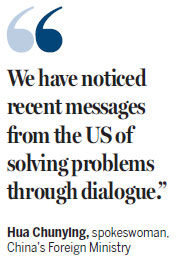China hopeful of more US dialogue on DPRK
Beijing has noticed recent messages from Washington about solving the Korean Peninsula nuclear issue through dialogue and negotiation, which is in line with China's approach to achieving denuclearization there, the Foreign Ministry said on Wednesday.
"Now there is a crucial window of opportunity for us to bring the peninsula nuclear issue back to the track of resolution through dialogue and negotiation," ministry spokeswoman Hua Chunying told a briefing in Beijing.
On Tuesday, US Secretary of State Rex Tillerson, speaking at a joint press meeting with New Zealand Prime Minister Bill English in Wellington, said: "All the regional partners, including China, have reaffirmed without question their commitment to a denuclearized Korean Peninsula.

"And so now I think the question is: How do we work together collectively to bring Pyongyang to the table, to have a discussion about that future, a different future than the one they have charted thus far?"
Commenting on Tillerson's remarks, Hua said China has stressed many times that the peninsula nuclear issue has existed for a long time and is highly complicated.
It must and can only be settled by accommodating and resolving the reasonable security concerns of various parties through dialogue and negotiation and addressing both the symptoms and root causes, she said.
"We have noticed recent messages from the US of solving problems through dialogue and negotiation, which is in line with China's 'parallel-track' approach and 'suspension for suspension' proposal," Hua said.
The "parallel-track" or "dual-track" approach calls for denuclearizing the peninsula while also establishing a path to ensure peace; the "dual-suspension" proposal calls for suspending Pyongyang's nuclear and missile activities as well as large-scale drills by Washington and Seoul, according to the ministry sources.
"We hope that relevant parties can bear the general picture in mind, seize the opportunity, demonstrate sincerity and make constructive efforts to push for denuclearization, peace and stability on the peninsula," Hua said.
In talking about US policy options for the Democratic People's Republic of Korea, Evans Revere, senior director with the Albright Stonebridge Group, said, "The policy I am advocating is pressure plus negotiations to get to a freeze and denuclearization."
He said that denuclearization is the "ultimate goal", according to Averting Catastrophe: US Policy Options for North Korea, a Brookings Institution interview of six experts conducted by Brookings Foreign Policy Program Director Bruce Jones on April 18.
huanxinzhao@chinadailyusa.com
(China Daily USA 06/08/2017 page2)
















